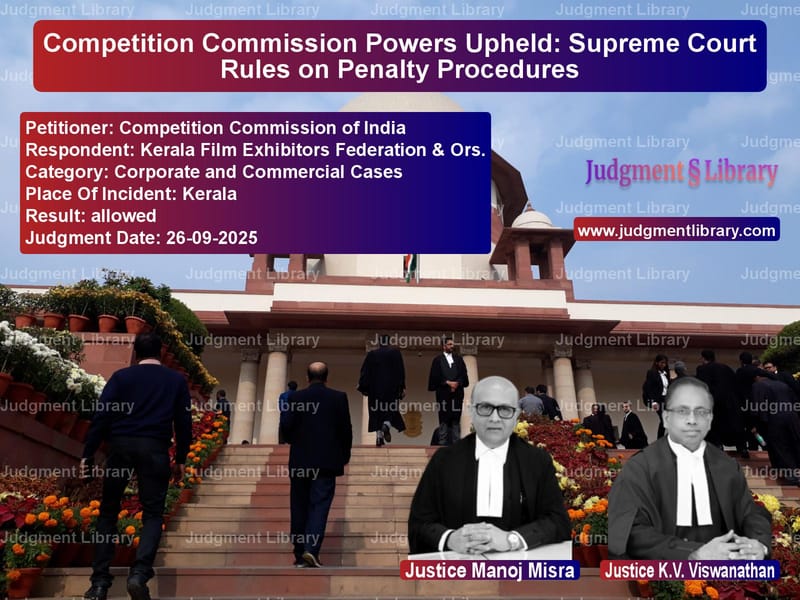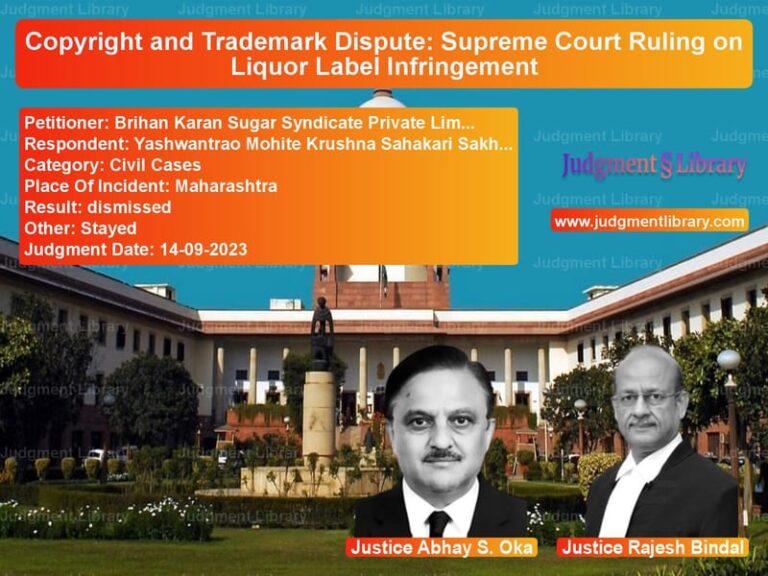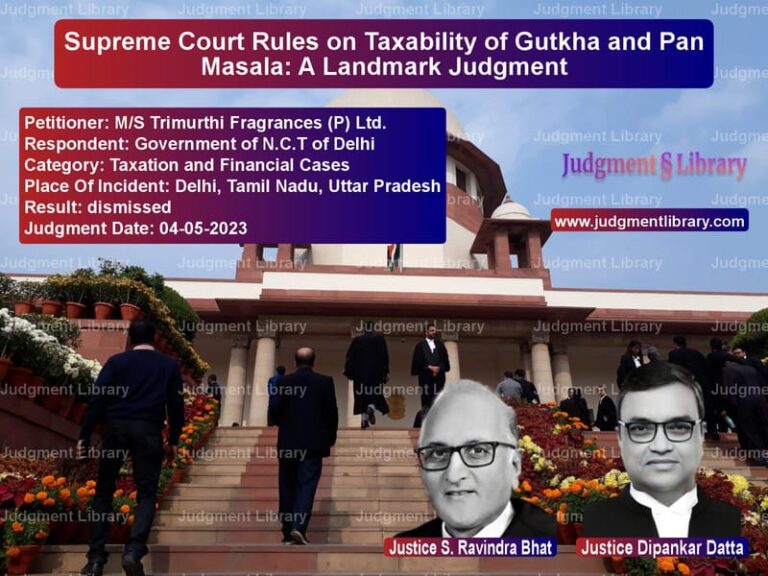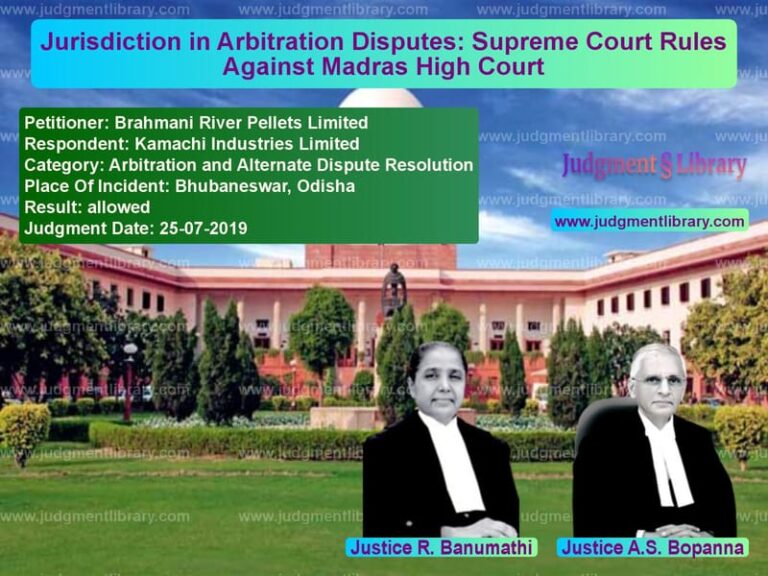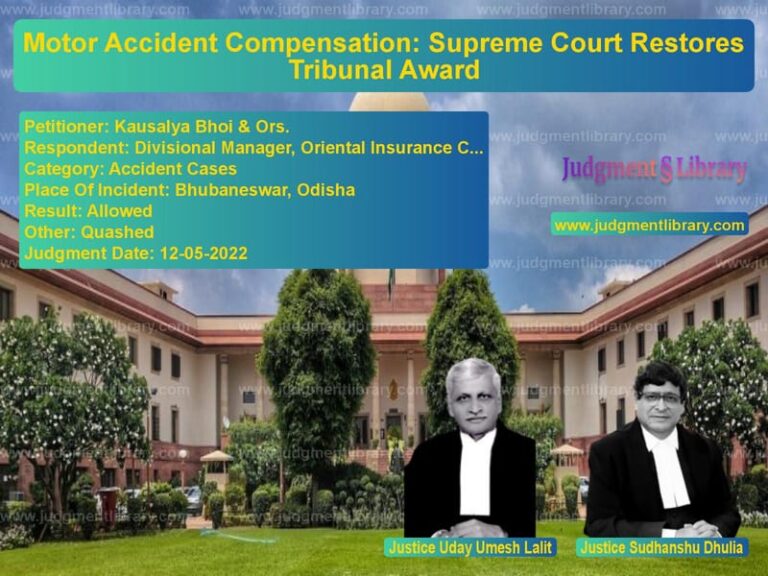Competition Commission Powers Upheld: Supreme Court Rules on Penalty Procedures
In a landmark judgment that strengthens the regulatory powers of India’s competition watchdog, the Supreme Court has delivered a decisive ruling on the procedures for imposing penalties on companies and their office-bearers for anti-competitive practices. The case involved the Kerala Film Exhibitors Federation and its office-bearers who were found guilty of preventing film distributors from supplying movies to a particular theater. The legal battle centered around whether the Competition Commission of India needed to issue a separate notice specifically proposing the penalty before imposing it, or whether the existing procedure of providing the investigation report and hearing the parties was sufficient. The court’s ruling has significant implications for how competition law is enforced in India, balancing the need for effective regulation with the principles of natural justice.
The dispute began when Crown Theatre filed a complaint with the Competition Commission of India alleging that the Kerala Film Exhibitors Federation and its office-bearers were engaging in anti-competitive activities. The specific allegation was that film distributors were threatened that their films would not be screened at cinema halls belonging to members of the Federation if those distributors offered their films for exhibition at Crown Theatre. The Federation was accused of calling for a strike or ban on exhibition of films by its members specifically targeting Crown Theatre, which had resigned from the Federation’s membership.
The Director General investigated the matter and submitted a report that found the Federation had contravened Section 3(3) of the Competition Act. The report specifically identified the President, Mr. P.V. Basheer Ahamed, and the General Secretary, Mr. M.C. Bobby, as key decision-makers who played an active role in the anti-competitive activities. The Commission then issued a notice on June 10, 2015, forwarding the investigation report to these individuals and directing them to file their replies and appear for hearing.
After hearing the parties, the Commission passed its final order on September 8, 2015, finding that the Federation had violated competition law and imposing penalties. The Federation was directed to pay a penalty of approximately Rs. 82,414, while the individual office-bearers were directed to pay penalties of Rs. 56,397 and Rs. 47,778 respectively. More significantly, the Commission directed that the Federation should not associate with these office-bearers in its affairs for two years, and correspondingly, the office-bearers were directed not to associate with the Federation for the same period.
The respondents appealed to the Competition Appellate Tribunal, which upheld the findings on merits but set aside the penalty and directions against the individual office-bearers. The Tribunal held that since no specific notice was given to the office-bearers proposing to impose penalty on them and debar them from participating in the Federation’s affairs, there was violation of principles of natural justice. The Tribunal stated clearly: “Admittedly, no notice was given by the Commission to Appellants Nos. 2 and 3 proposing to impose penalty on them and to debar them from participating in the affairs of Appellant No. 1 and no opportunity of hearing was afforded to them to represent their cause. Thus, there is no escape from the conclusion that the directions contained in Clauses (d) and (e) of paragraph 9 of the impugned order are vitiated due to violation of the principles of natural justice.”
The Competition Commission of India then approached the Supreme Court, arguing that the procedure followed was adequate and in accordance with the law. The appellant Commission, represented by Mr. Arjun Krishnan, contended that the office-bearers were covered under Section 48 of the Competition Act and that the scheme of the Act contemplates a single hearing. “According to the learned counsel, the COMPAT committed a serious error in setting aside the penalty and directions against Respondent Nos.2 and 3 on the erroneous ground that no notice was issued to them. According to the learned counsel, the scheme of the Act contemplates a single hearing.” The counsel argued that adequate opportunity was given when the investigation report was furnished and their comments were called for.
On the other side, the respondents, represented by Mr. Harshad V. Hameed, defended the Tribunal’s order. “According to the learned counsel, regulatory authorities ought to provide adequate notice and opportunity before imposing penalties failing which their orders would be vulnerable on the ground of violation of principles of natural justice.” The respondents argued that merely supplying a copy of the investigation report did not constitute sufficient notice for the purpose of imposing penalty, and that a specific show cause notice addressing the proposed penalty was required.
The Supreme Court, after examining the provisions of the Competition Act and the regulations, came to a clear conclusion about the adequacy of the procedure followed. The court emphasized that “the notice dated 10.06.2015 issued in the present case fulfils the requirement in law as it then stood.” The court explained that the notice was categoric in pointing out the contraventions alleged in the investigation report and clearly identified the individuals who were key personnel in charge of the affairs of the Federation. A clear opportunity was given to file replies and objections, and the respondents could complain of no prejudice.
The court made important observations about the nature of penalties under competition law, distinguishing between monetary penalties and behavioral remedies. The judgment noted that “The behavioural remedy imposed on Respondent No. 1 can never be given effect to unless the corollary part of that direction, directing the Respondent No. 2 and 3 not to associate themselves with Respondent No.1 (KFEF), is given effect to.” This recognition of behavioral remedies as essential tools for competition regulation was a significant aspect of the judgment.
On the crucial question of whether a second notice specifically proposing penalty was required, the court was categorical: “There is no mandate in the statute for the issuance of a second show cause notice setting out the proposed penalty.” The court referred to the Report of the Competition Law Review Committee which had specifically deliberated on this issue but concluded that the Act as it stood provided a fair opportunity and that a separate penalty hearing was not recommended.
The court also emphasized the importance of time-bound proceedings in competition matters, noting that “time is of essence under the statute.” The judgment referred to earlier decisions that had stressed the need for speedy disposal of competition cases, observing that “Providing a back and forth between the regulator and the person in breach to arrive at an appropriate penalty can defeat the purpose of the Act and can be a source of great abuse as the time given can be used to even present the Commission with a fait accompli, defeating the object of the Act.”
On the question of natural justice, the court made an important distinction: “NOTICE IS TO ANSWER THE CONTRAVENTION – NOT THE PROPOSED PENALTY.” The judgment explained that the opportunity given was to explain the charges and not the proposed punishment, drawing parallels with labor jurisprudence where this principle is well-established.
The court also found that the penalties imposed were proportionate to the violations. The judgment noted that “The monetary penalty was meagre. The acts committed had serious and deleterious effect on the informant and the general public and unless deterrent penalties were imposed prejudice to public would have been enormous.” The court particularly noted that the office-bearers had been found to indulge in similar anti-competitive conduct in an earlier case, and mere monetary penalty had not acted as a deterrent.
The Supreme Court’s conclusion was clear and decisive: “For the reasons stated above, we allow the appeal and set aside the judgement of the COMPAT dated 04.02.2016 in Appeal No.99/2015 insofar as it set aside the penalty and directions against Respondent Nos.2 and 3.” The court restored the Competition Commission’s order in its entirety, including the directions debarring the office-bearers from association with the Federation for two years.
This judgment represents a significant strengthening of the Competition Commission’s powers to enforce competition law in India. By upholding the procedure followed by the Commission and recognizing the importance of behavioral remedies alongside monetary penalties, the Supreme Court has ensured that the competition regulator has the necessary tools to effectively address anti-competitive practices. The judgment balances the need for effective regulation with the principles of natural justice, recognizing that in the specialized field of competition law, the procedures must be practical and efficient while remaining fair. The ruling provides clarity on the procedural requirements for imposing penalties and will guide future cases involving anti-competitive behavior by trade associations and their office-bearers.
Petitioner Name: Competition Commission of India.Respondent Name: Kerala Film Exhibitors Federation & Ors..Judgment By: Justice Manoj Misra, Justice K.V. Viswanathan.Place Of Incident: Kerala.Judgment Date: 26-09-2025.Result: allowed.
Don’t miss out on the full details! Download the complete judgment in PDF format below and gain valuable insights instantly!
Download Judgment: competition-commissi-vs-kerala-film-exhibito-supreme-court-of-india-judgment-dated-26-09-2025.pdf
Directly Download Judgment: Directly download this Judgment
See all petitions in Corporate Governance
See all petitions in unfair trade practices
See all petitions in Corporate Compliance
See all petitions in Company Law
See all petitions in Judgment by Manoj Misra
See all petitions in Judgment by K.V. Viswanathan
See all petitions in allowed
See all petitions in supreme court of India judgments September 2025
See all petitions in 2025 judgments
See all posts in Corporate and Commercial Cases Category
See all allowed petitions in Corporate and Commercial Cases Category
See all Dismissed petitions in Corporate and Commercial Cases Category
See all partially allowed petitions in Corporate and Commercial Cases Category

